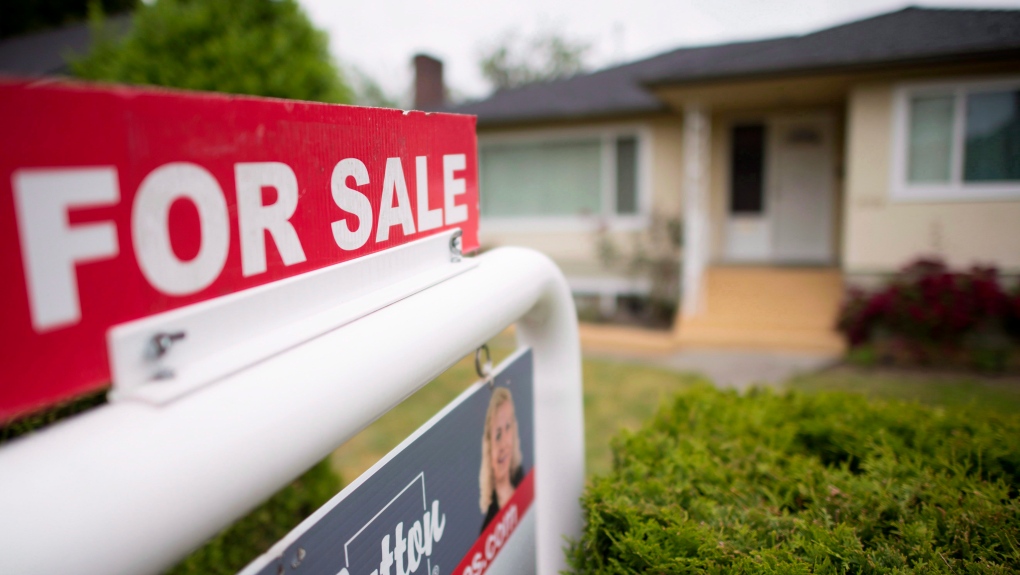Cooling trend continues in B.C.'s residential real estate market
 A real estate sign is pictured in Vancouver, B.C., Tuesday, June, 12, 2018. THE CANADIAN PRESS/Jonathan Hayward
A real estate sign is pictured in Vancouver, B.C., Tuesday, June, 12, 2018. THE CANADIAN PRESS/Jonathan Hayward
High interest rates are continuing to have a cooling effect on B.C.'s residential real estate market, as sales slump, active listings plateau and average prices dip.
The BC Real Estate Association's October report shows a 45.5 per cent decline in the number of sales, a 47.2 per cent drop in sales volume and a 3.1 per cent decline in average price compared to the same time last year.
"It's pretty much a continuation of the trends that we've been seeing since rates started rising, and rising rapidly," Brendon Ogmundson, the association's chief economist says.
"We have rates at their highest levels since 2007 and going up at the fastest pace since the early 1990s. That's having a major impact on sales activity.”
The current state of the market means buyers will have more time and more choice than they did amid the frenzied activity of 2021 when low inventory triggered bidding wars and quick sales on many listings.
"Buyers probably have a bit of an upper hand but generally what we're seeing is a market that's kind of finding some balance," Ogmundson says.
"As long as we have rates at these levels, we're going to see pretty slow activity. On the supply side it looks like things are kind of plateauing. We're just getting back to pre-pandemic levels of active listings in the last month or so."
Sellers will have to adjust, he adds, to the reality that their listings will sit on the market for longer and that process may have to be reduced.
"Whenever you have a market that transitions this quickly, buyers and sellers, their expectations – especially on price – are pretty far apart," Ogmundson explains, saying sellers are slower to adjust to the changes.
A regional breakdown shows that drops in both price and activity are most pronounced in the Fraser Valley, which includes Surrey and Langley, and farther east in Chilliwack. In the former, the average price is down 8.3 per cent while sales are down 53.9 per cent. In the latter, the price has dropped by 11.9 per cent while sales have dropped by 60.9 per cent.
Ogmundson says this is largely due to a pull back on demand in those markets, where a desire for extra space and a transition to working form home drove demand and prices up in the earlier days of the pandemic. With people returning to in-person offices and high gas prices, commuters are generally shifting their focus on properties closer to the city centre.
In Greater Vancouver, year-over-year prices were up 0.7 per cent compared to 2021, with the average sitting at $1,231,805. Ogmundson says the relatively modest fluctuation reflects the fact that demand in this area did not see the same kind of rapid rise as in other markets.
CTVNews.ca Top Stories

Trudeau asked Trump for California, Vermont to curb annexation talks
Justin Trudeau says U.S. president-elect Donald Trump kicked the tires on the potential annexation of Canada during their recent meeting in Florida, but the topic was quickly dropped when the prime minister countered with a request for two states.
Man dies after falling into sink hole at Fernie Alpine Resort
An investigation is underway by Elk Valley RCMP after a man died Wednesday after falling into a sink hole at Fernie Alpine Resort.
One Alberta man gets jail, another community time for 2022 Coutts border protest
Two Alberta men have been sentenced for their roles in the illegal Coutts border blockade in 2022.
Liberal leadership: Carney expected to launch bid next week, Clark organizing heavily, Gould considers entering
While longtime cabinet ministers Dominic LeBlanc and Melanie Joly have officially announced they have no plans to run for the Liberal leadership, several well-known faces are organizing behind the scenes to launch bids of their own.
Amid tense backdrop, Canadian warship gets friendly message from Chinese vessel tracking movements
Daybreak on HMCS Ottawa began with a call over the marine radio from a Chinese warship. The call is coming from a Chinese Frigate known as the Yuncheng, the warship has been shadowing HMCS Ottawa through the South China Sea for two days and counting.
'Everything is gone': Sask. business owner loses Los Angeles home to wildfires
A Saskatchewan business owner lost her Los Angeles home as wildfires ravage parts of the city.
Trump gets no-penalty sentence in his hush money case, while calling it 'despicable'
U.S. president-elect Donald Trump was sentenced Friday to no punishment in his historic hush money case, a judgment that lets him return to the White House unencumbered by the threat of a jail term or a fine.
'Devastating beyond words': Paris Hilton shows remnants of home destroyed by L.A. fire
Socialite Paris Hilton shared a video showing her ravaged house, destroyed by the L.A. wildfires., 'I’m standing here in what used to be our home, and the heartbreak is truly indescribable,' Hilton wrote on Instagram.
School software hack hits school boards across six Canadian provinces
School boards across Canada are grappling with the fallout from a significant cyberattack on PowerSchool, a widely used administration software platform.
































